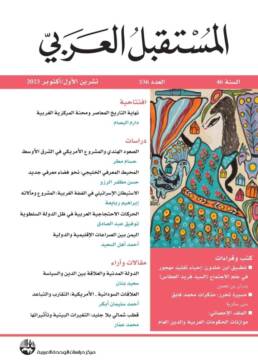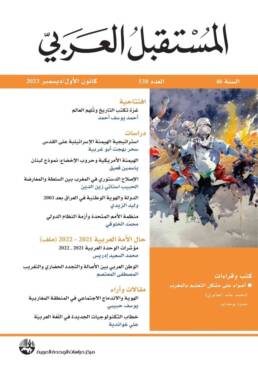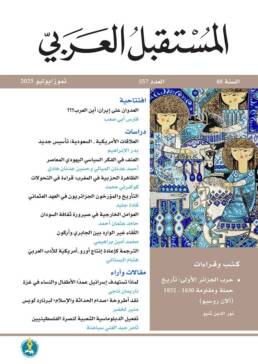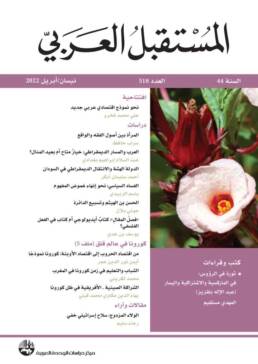⬛ Editorial
⬜ Arabs in the Era of Reshaping the
Global Order Kamal Khalaf Al-Tawil 7
⬛ Studies
⬜ Al-Jabri and the Arab Moral Mind between the
Horizons of chivalry and interest Yusuf Marimi 11
This study aims to outline the ethical project of the thinker Muhammad Abed al-Jabri, through a reading of his book The Arab Moral Mind: An Analytical and Critical Study of the Systems of Values in Arab Culture, which forms the fourth and final part of his project Critique of Arab Reason. Based on a critical analytical methodology, it becomes evident that this project has relevance in the context of contemporary moral philosophical thought in our Arab context. This is because it critiques various manifestations of «ethics of obedience,» particularly in Persian, Greek, and Sufi heritages. For this reason, Al-Jabri focuses on two legacies: a purely Arab one (based on the value of chivalry or manliness), and a purely Islamic one (based on the value of interest or benefit), as they both provide pathways for the ethics of liberation and creativity.
Keywords: Ethical philosophy, foundation of ethics, Arab moral thought, chivalry, interest.
⬜ October War/October 1973: Between Liberation
and Mobilization Muhammad Al-Hadi Saleh 23
After the defeat of 1967, Nasser began preparing for war against Israel under the banner of removing the consequences of aggression, aiming to restore the Arab lands occupied by Israel in 1967. He entered into a war of attrition against the Israeli army and began rebuilding the Egyptian army in terms of armament and organization in preparation for a liberation war within a few years. However, the absence of Nasser in 1970 and the assumption of power by Anwar Sadat in Egypt changed the war plan and its objectives. This study explores the policy of Egyptian President Anwar Sadat regarding the issue of liberating the occupied territories of 1967, the objectives he rearranged for this war, and their connection to the peace plan with Israel at the expense of restoring the occupied territories, removing the consequences of aggression, and the Palestinian cause.
Keywords: War of Attrition, October War 1973, Anwar Sadat, Egyptian-Israeli Peace Agreement, Egyptian-American Relations.
⬜ The Palestinian Cause in the National Education Curr
Muhammad Saleh Al-Misfer & Maysar Hassan Suleiman 41
This study examines the Palestinian cause in the educational curricula of Qatar. It highlights Britain’s obstructive role in education during its dominance over the Gulf region from the early 19th century until the early 1970s. The study also discusses the development of the education system in Qatar since 1913, culminating in the establishment of the Ministry of Education in 1957. It then focuses on education from the early 1990s, a period in which education gained significant importance for the Qatari leadership. The study aims to understand the role of the Palestinian cause in Qatar’s education system and presents various curricula and educational materials related to this cause. It also examines how the Palestinian cause, Arabic language, and history curricula were influenced during the period of RAND Corporation’s control over education in the country.
Keywords: Reforms, RAND Corporation, Palestinian cause, education curricula, State of Qatar, Britain, modernization.
⬜ The Jews in Lebanon during the Modern Era: From Coexistence
to Separation Salim Hani Mansour & Ibrahim Anwar Al-Hout 54
Jews have lived in the Arab world and resided in various regions, working in different professions and practicing their religious rituals freely. In Lebanon, the Jewish community lived and enjoyed civil rights like other sects, and it remains listed in official records. However, in recent decades, the community has ceased its social, economic, and religious activities. Where is the Jewish community in Lebanon today, and how did it disappear? This study aims to clarify the aspects of coexistence and peace that the Jews experienced in Lebanon, as well as to explore the extent to which the Jewish community assisted the Zionist entity in activities such as smuggling Jews, providing financial support, and supplying weapons. It also examines the extent to which the Zionist entity attracted, influenced, and recruited Lebanese Jews.
Keywords: Jews, Lebanon, migration, dealings with Zionism, Palestine.
⬜ Cultural Production in Contemporary Morocco: Between
Uniqueness and Intolerance Muhammad Al-Sheikh Banan & Suad Al-Zrouwali 73
Culture, especially that which manifests resistance, is a form of memory in contrast to forgetfulness. With this understanding, culture becomes of significant importance; cultural production has a strong analytical capacity that leads to overcoming ready-made frameworks, as culture consists of intellectual patterns, values, and beliefs that are common among a group of individuals. Thus, studying part of the cultural production in contemporary Morocco allows for an examination of the Amazigh, Arab, and Sahrawi organizations and coordinations, which have played roles in advocating for linguistic and cultural rights. This is especially true after 2011, when these movements shifted from defending linguistic rights at both the national and local levels to demanding the restoration of certain lands from the state and granting them to tribes.
Keywords: Cultural production, Amazigh, Arabic, Sahrawi, land.
⬜ Kinship and Neighborliness in the Algerian Political and
Electoral Urban Space: Toward Overcoming Patronage and
Building Participatory Engagement? Bouhania Qaoui 92
The concept of kinship and neighborliness appears to be one of the most widely discussed postmodern concepts, as it is one of the sub-local notions that transcend modern frameworks. Concepts of kinship manifest in the literature of global political systems, often used in the form of blatant patronage relationships during political election campaigns. Algeria has experienced varied electoral dates since the political movement of 2019, during which the concepts of kinship and proximity changed in the weekly marches every Friday, thus canceling the demands of classical national geography. This paper, on one hand, aims to approach the topic of the relationship between kinship and neighborliness as socio-political concepts, and on the other hand, examines their connection with patronage behavior, electoral politics, and the urban and social space.
Keywords: Kinship, geographical neighborliness, conflicts, tribalism, patronage, elections.
⬜ The Institution in the Individual Voting Law in Tunisia: Presence
or Absence? (Legislative Elections 2022) Samia Bouabid 112
In a new initiative related to the traditions of elections in Tunisia, the individual voting law was introduced, aiming to change the political actors by shifting the vote from institutions to individuals. Citizens gained the right to run for office individually, without party affiliation. This research discusses the new electoral law in Tunisia, its relationship with social actors, and its potential to create a qualitative shift in the role of social actors in public affairs. The study seeks to determine the presence of institutions in these elections and whether trust in institutions has been withdrawn in favor of individuals. The study concludes by revealing the new methods that institutions adopted in political work by changing their mechanisms for integration into public affairs, emerging once again through individuals.
Keywords: Tunisia, political participation, electoral law, individual voting, political parties.
⬜ Electric Cars and the War on Fossil Fuels and Its Impact on the
Gulf Countries Hussein Ahmed Al-Bouhailega 129
The global shift towards electric cars has significantly impacted the automotive industry and dealt a strong blow to oil producers. This transition has had a negative effect, especially on oil companies in the Gulf countries such as Saudi Arabia and the UAE, where reduced oil sales and falling prices have caused severe economic consequences. This study examines the political and economic implications of the global shift towards electric cars, focusing on regions such as the European Union and the United States, and analyzes its impact on oil-producing Gulf countries. The study also explores how these countries are seeking alternative and sustainable solutions to prepare for a post-oil future, amid international efforts to reduce oil imports.
Keywords: Electric cars, fossil fuels, carbon emissions, Gulf Cooperation Council, oil.
⬛ Articles and Opinions
⬜ Between Dey’at Day’a and Al-Arabji: The Encrypted Political
Culture Muhammad Si Bashir 146
⬛ Books and Readings
⬜ Interactive Localization in Social Sciences: The Idea and the Metric
(Naif Bin Nahar) Meryem Al-Dubai & Bedran Bin Lahsen 156
⬜ More Books Gaby El-Khoury 161
Arabic Books: In the beginning was the transformation: an analytical reading of the contemporary world; Israeli politics in managing the conflict and its impact on the future of the settlement process; The international rise of the South and the reshaping of the international system; Big Data: A digital revolution shaping the future of the world in economy, politics, and security
Foreign Books: America’s Middle East: The Ruination of a Region; Transformed by the People: Hayat Tahrir al-Sham’s Road to Power in Syria; Iran’s Rise and Rivalry with the US in the Middle East.
Research Reports: «Syria’s Transitional Honeymoon Is Over after Massacres and Disinformation»; «Moving Past «Wait and See» in South Lebanon: The U.S.-French Role»; «The Gaza War Resumes».
Add a review
You must be logged in to post a review.








